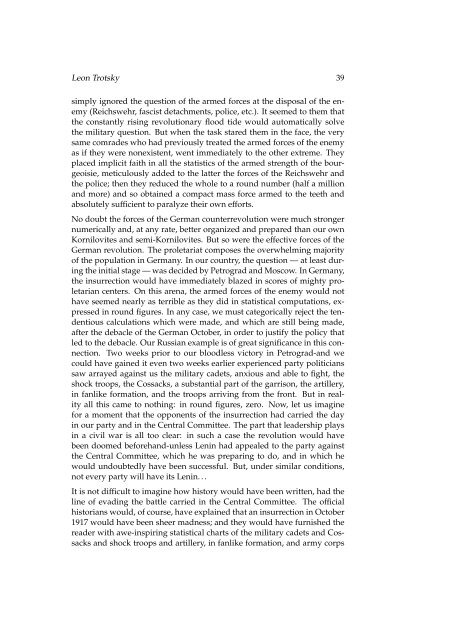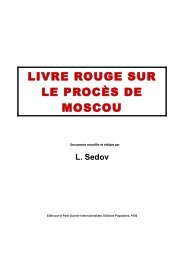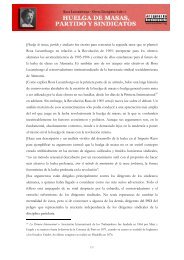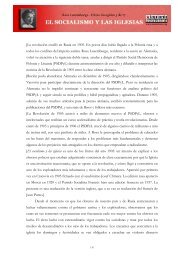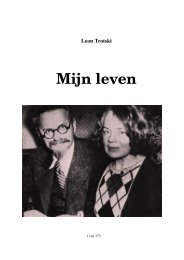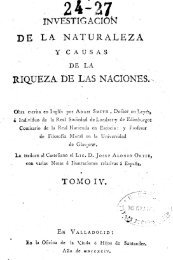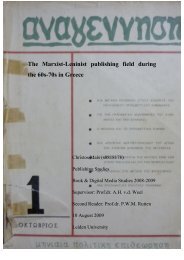Leon Trotsky, The Lessons of October - Platypus
Leon Trotsky, The Lessons of October - Platypus
Leon Trotsky, The Lessons of October - Platypus
Create successful ePaper yourself
Turn your PDF publications into a flip-book with our unique Google optimized e-Paper software.
<strong>Leon</strong> <strong>Trotsky</strong> 39simply ignored the question <strong>of</strong> the armed forces at the disposal <strong>of</strong> the enemy(Reichswehr, fascist detachments, police, etc.). It seemed to them thatthe constantly rising revolutionary flood tide would automatically solvethe military question. But when the task stared them in the face, the verysame comrades who had previously treated the armed forces <strong>of</strong> the enemyas if they were nonexistent, went immediately to the other extreme. <strong>The</strong>yplaced implicit faith in all the statistics <strong>of</strong> the armed strength <strong>of</strong> the bourgeoisie,meticulously added to the latter the forces <strong>of</strong> the Reichswehr andthe police; then they reduced the whole to a round number (half a millionand more) and so obtained a compact mass force armed to the teeth andabsolutely sufficient to paralyze their own efforts.No doubt the forces <strong>of</strong> the German counterrevolution were much strongernumerically and, at any rate, better organized and prepared than our ownKornilovites and semi-Kornilovites. But so were the effective forces <strong>of</strong> theGerman revolution. <strong>The</strong> proletariat composes the overwhelming majority<strong>of</strong> the population in Germany. In our country, the question — at least duringthe initial stage — was decided by Petrograd and Moscow. In Germany,the insurrection would have immediately blazed in scores <strong>of</strong> mighty proletariancenters. On this arena, the armed forces <strong>of</strong> the enemy would nothave seemed nearly as terrible as they did in statistical computations, expressedin round figures. In any case, we must categorically reject the tendentiouscalculations which were made, and which are still being made,after the debacle <strong>of</strong> the German <strong>October</strong>, in order to justify the policy thatled to the debacle. Our Russian example is <strong>of</strong> great significance in this connection.Two weeks prior to our bloodless victory in Petrograd-and wecould have gained it even two weeks earlier experienced party politicianssaw arrayed against us the military cadets, anxious and able to fight, theshock troops, the Cossacks, a substantial part <strong>of</strong> the garrison, the artillery,in fanlike formation, and the troops arriving from the front. But in realityall this came to nothing: in round figures, zero. Now, let us imaginefor a moment that the opponents <strong>of</strong> the insurrection had carried the dayin our party and in the Central Committee. <strong>The</strong> part that leadership playsin a civil war is all too clear: in such a case the revolution would havebeen doomed beforehand-unless Lenin had appealed to the party againstthe Central Committee, which he was preparing to do, and in which hewould undoubtedly have been successful. But, under similar conditions,not every party will have its Lenin. . .It is not difficult to imagine how history would have been written, had theline <strong>of</strong> evading the battle carried in the Central Committee. <strong>The</strong> <strong>of</strong>ficialhistorians would, <strong>of</strong> course, have explained that an insurrection in <strong>October</strong>1917 would have been sheer madness; and they would have furnished thereader with awe-inspiring statistical charts <strong>of</strong> the military cadets and Cossacksand shock troops and artillery, in fanlike formation, and army corps


